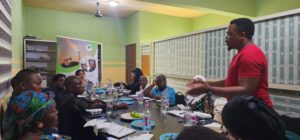Spaces for Change | S4C, with support from the UK’s Institute of Development Studies, organized consultative meetings with diverse groups of stakeholders to draw important lessons and perspectives for undertaking more inclusive and effective engagement of those affected by energy transitions in Nigeria. The consultations, held on July 14 & 20, in Imo and Rivers States respectively, under the banner of a new project, “Learning at the Intersections of Just Transitions”, targeted 40 selected advocacy groups, regulatory bodies, resource governance agencies, and ministries at the subnational levels, social movements, resource-rich communities and other private actors working on energy and natural resources.
Discussions began by examining the multifaceted impacts of climate change in resource-rich communities in the two states, ranging from ozone layer depletion, hot temperatures, receding coastlines, extinction of certain animal species, submerged farmlands, vanishing settlements, low agricultural yields, seasonal changes, flooding, erosion and other types of ecological damage. While stakeholder perspectives varied significantly across urban and rural settings, it was clear that the impacts of climate change are widely felt and understood. On the other hand, knowledge of the causative factors of climate change and its linkage to the clamor for energy transition is quite limited. This knowledge gap informed discussions regarding how to bridge the data gaps for tackling the climate crisis and identifying the core principles to be included in national and subnational frameworks for strengthening the engagement of marginalized groups in energy transition processes.
Nigeria unveiled its Energy Transition Plan (ETP) in August 2022 as a national blueprint for frog-leaping into a low-carbon future. Despite setting ambitious targets to phase out carbon-polluting fuels, including crude oil, by 2060, the ETP is notably silent on communities and was designed with scant community participation. Unsurprisingly, the voices of marginalized groups especially in the oil-rich communities that would be potentially affected by energy transition are either absent or under-represented in national discourses around decarbonizing the environment. Community exclusion in national energy transition plans is already documented in S4C’s research, “Energy Transition in Nigeria’s Oil-Rich Communities.
Insights from the consultative meetings showed that stakeholders at the subnational and community levels were hearing about energy transition for the first time, but welcomed the rationale behind cuts in emissions and the imperative to boost national resilience to climate shocks. This provoked deep discussions into what works and what doesn’t work for diverse interest groups, and the course of correction that voices from the margins would want to see in any decarbonization, climate mitigation, or adaptation measures designed at the federal and state levels. Key issues raised and discussed include the incorporation of human rights principles of inclusion, transparency, and environmental accountability; recognition of gender-differentiated impacts of climate change; differentiated impacts of climate change across states of the federation; clarity of roles for state and local government councils; implementation modalities and climate financing at the subnational level; the provision of alternative sustainable livelihoods; and the inclusion of a comprehensive environmental cleanup plan within the ETP.
Inclusion and inclusiveness were the most popular buzzwords throughout the consultations in both states. This sparked discussions about new and existing spaces for reflection and peer-learning within public and private spheres at the subnational, local government, and community levels for building broad alliances and advancing social justice in the energy transition discourse. The Nigerian government can leverage these existing spaces, and create new ones, to bring groups together for deliberation over their diverse goals and associated trade-offs, in order to bring about an energy transition that is equitable, sustainable, and transformative of unjust power relations that characterized the fossil-fuel era.
The consultations wrapped up with varied perspectives on what alternative livelihoods in a post-oil era should look like. Suggestions ranged from critical investments in modern farming technology, quality education for the youth especially in fields such as solar technology, biotech, production of electric cars and renewable energy(RE)-powered vehicles, sewage plants, gas cylinder production, metal fabrication and gas plants. While some suggested the development of new educational curricula that emphasize courses relevant to the new energy future, others insisted that communities should have equity capital or shareholding in renewable energy initiatives sited in their localities which is a clear departure from the community development assistance projects by oil companies, which have never really benefitted communities in the long term. Consequently, millions of naira were wasted on projects that communities don’t need.
As Nigeria strives towards a zero-carbon future, the insights and recommendations from marginalized oil-rich communities are invaluable. Most importantly, inclusive social engagement and acceptance are essential to avoid conflicts and resistance to national climate commitments. The government must actively involve all stakeholders, listen to local voices, and address the unique needs and challenges faced by these communities.





















